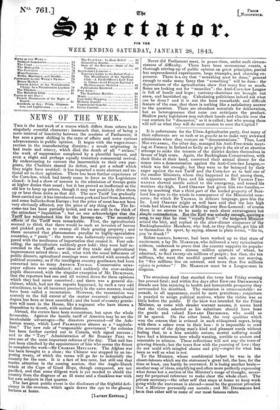The atrocious deed that startled the town last Friday evening
has proved fatal ; and within five days after EDWARD DRUMMOND'S friends saw him rejoicing in health and honourable prosperity they surrounded his deathbed. The visitation is unaccountable : no assault, to all appearance, could be more gratuitous ; conjecture is puzzled to assign political motives, where the victim was so little before the public. If the blow was intended for the Prime Minister, as some with slender warrant assume, it seems hard that the victim selected as his substitute should have been the gentle and valued EDWARD DRUMMOND, who could so ill be spared. On the other hand, the very qualities which won the esteem that is evinced in such widespread regret, bring with them a solace even in their loss : it is impossible to read the account of the dying man's kind and pleasant words without feeling that, to a less amiable nature, mortal suffering would have had a bitterness here wholly wanting, terrible to endure and miserable to witness. These reflections will not stay the tears of grieving friends; but the tears flow with the yearning of love ; they do not scald with mingled shame and pity—regret for what has been as well as what is not.
To the Minister, whose confidential helper he was in the closet-labours which are the statesman's great toil, the loss, for the time at least, can hardly be overrated. It is losing another brain— another map of ideas, amplifying and often more perfectly expressing what forms but a section of the Minister's range of thought, neces- sary for perpetual reference to make clear the whole chart. The private secretary—the other self that stays at home to keep work going while the statesman is abroad—must be the greatest privation that a Minister personally can sustain ; and Mr. DRUMMOND had been that other self to some of our most famous rulers.


























